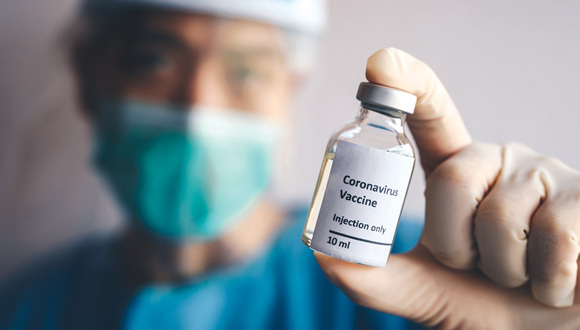Here's What the FDA's Full Approval of the Pfizer & Moderna COVID-19 Vaccines Mean for You
Feb. 14, 2022 - Katie McCallumOn Aug. 23, 2021, the FDA granted full approval to the Pfizer COVID-19 vaccine. Next, on Jan. 31, 2022, the agency granted full approval to the Moderna COVID-19 vaccine.
"These vaccines were initially granted emergency use authorization (EUA), which allowed them to be distributed in a timely manner during this devastating pandemic," explains Dr. H. Dirk Sostman, chief academic officer of Houston Methodist.
Since then, recent estimates suggest that COVID-19 vaccines have saved at least a quarter of a million lives and prevented more than 1 million hospitalizations.
"Now, the FDA has taken a step beyond EUA and granted full approval to these vaccines," says Dr. Sostman.
Specifically, Pfizer is fully approved for the prevention of COVID-19 in people 16 years of age and older, and Moderna is fully approved for people 18 years of age and older.
Each vaccine will continue to be available under its EUAs for:
- Teens who are between 12 to 15 years of age (Pfizer)
- Younger children between 5 to 11 years of age (Pfizer)
- Certain people as a third dose or booster shot (Pfizer and Moderna)
Additionally, the Johnson & Johnson COVID-19 vaccine will still be offered under its EUAs.
"Full FDA approval of these vaccines is significant because it firmly reinforces what we already knew: The COVID-19 vaccines are safe and effective," adds Dr. Sostman. "We are hopeful that full approval will give people additional confidence to get vaccinated."
Still, you might not be totally sure what "full approval" truly means — in general, as well as for you more specifically.
Full approval reinforces that the vaccine is safe and effective
"After hundreds of million vaccinations and reviewing nine months of data and information — not just from clinical trials, but large-scale vaccination efforts, too — the FDA has determined that the benefits of these vaccines continue to significantly outweigh the risk of getting COVID-19," says Dr. Sostman.
Before granting full approval, the FDA keeps its eye on a few things, including:
- Long-term effects and the potential for rare adverse events to arise
- How vaccine "efficacy" translates into real-world effectiveness
- Manufacturing quality control and consistency
One adverse event identified was the very small risk of experiencing an allergic reaction after receiving the vaccine. This didn't mean the vaccine was unsafe for most people, though. It simply changed how the vaccine is administered (people are monitored for 15 minutes after their shot) — and made this risk clearly known to those who are allergic to any of the vaccine's ingredients.
"For instance, vaccine distributors now knew they needed to ask about severe allergies before administering the vaccine," says Dr. Sostman.
Additionally, large-scale vaccination data helped inform how effective the vaccine is in the real world — bolstering the benefit of vaccination.
"Even with the more infectious omicron variant, both vaccines continue to provide strong protection against severe disease and hospitalization," says Dr. Sostman.
Full approval may help ease vaccine hesitancy
More than 200 million Americans have received at least one dose of COVID-19 vaccine.
Still, others have remained hesitant.
"We're hopeful that full approval provides these people with the confidence needed to get vaccinated as soon as possible. COVID-19 has taken more than 900,000 lives in the U.S. alone and vaccination is the best tool we have to protect against more death," says Dr. Sostman.
The FDA's message is clear: The Pfizer and Moderna COVID-19 vaccines meet the high standards for safety, effectiveness and manufacturing quality the agency requires of an approved product.
"If you're not yet vaccinated, now is the time. And if you have questions about the vaccines, I cannot stress enough how important it is to turn to a trusted health expert for guidance, rather than to social media that is full of myths and misinformation," adds Dr. Sostman.
For instance, your primary care doctor can help you understand how the vaccines work, the side effects that may occur and the benefits of vaccination. He or she can also provide tips on how to deal with vaccine anxiety and decision-making.
Full approval means a few more behind-the-scenes things
While it may not mean much to you right now, full approval means Pfizer and Moderna are now free to market the vaccines and continue to offer them beyond the pandemic.
Pfizer's COVID-19 vaccine will now also go by the name of Comirnaty and can be marketed to people 16+ for the prevention of COVID-19. Moderna's vaccine can now be marketed by the name of Spikevax to people 18+.
Full approval also means that the Pfizer and Moderna COVID-19 vaccines can now be prescribed "off label."
"What this means is that you and your health care provider can use the vaccine in a way that's not approved by the FDA," says Dr. Sostman.
An example of that right now would be as a booster shot in someone who's not quite eligible yet, for one reason or another.
This is very common with many FDA-approved medications that are used by physicians and patients outside of the FDA guidelines. But do keep in mind: If you and your health care provider make the decision to use one of these vaccines off label, know that FDA has not determined that this specific use is safe and effective.
Next Steps:
Sign up for your COVID-19 vaccine:
All individuals age 5 and older are currently eligible to receive a COVID-19 vaccine in Texas.


